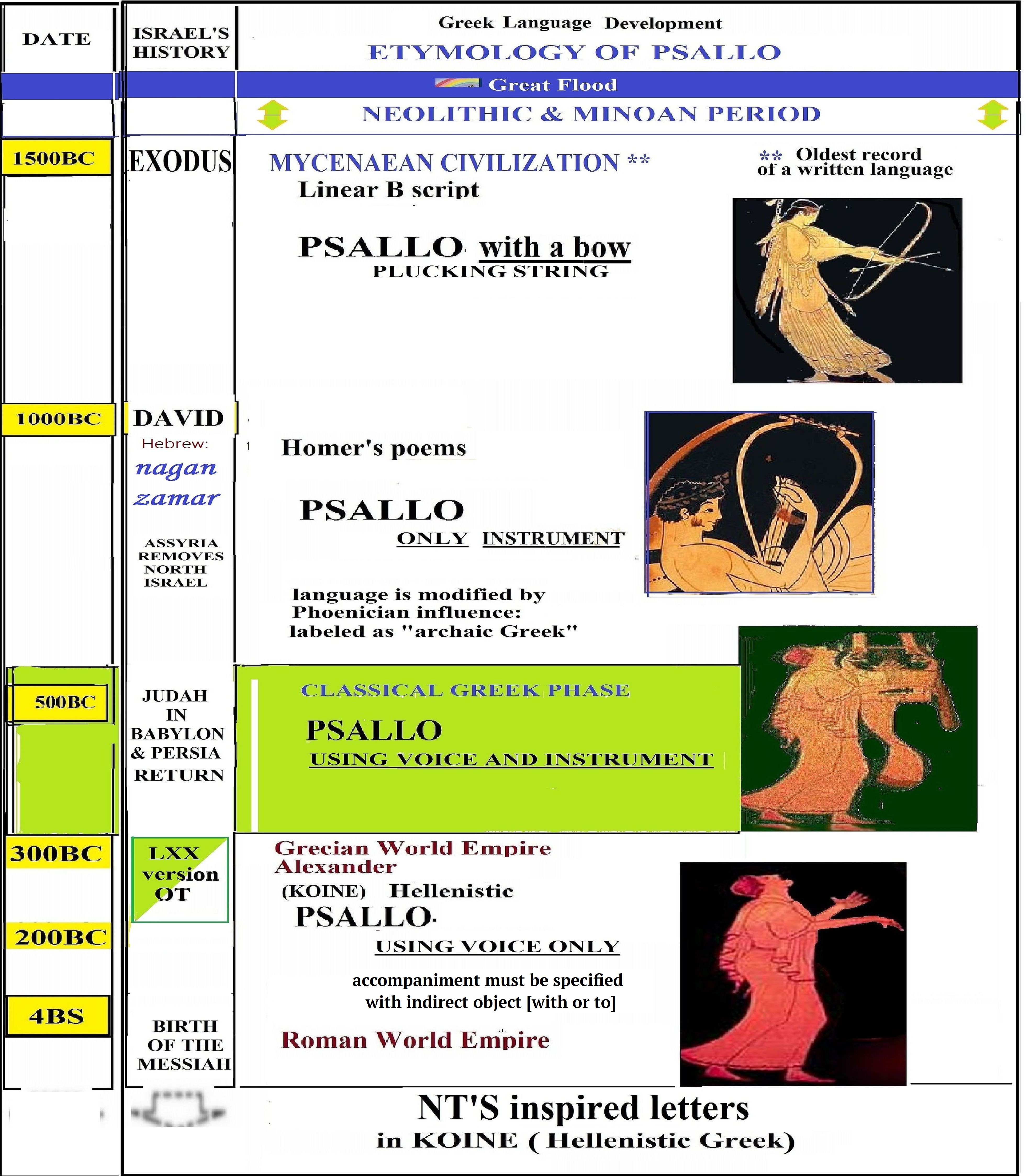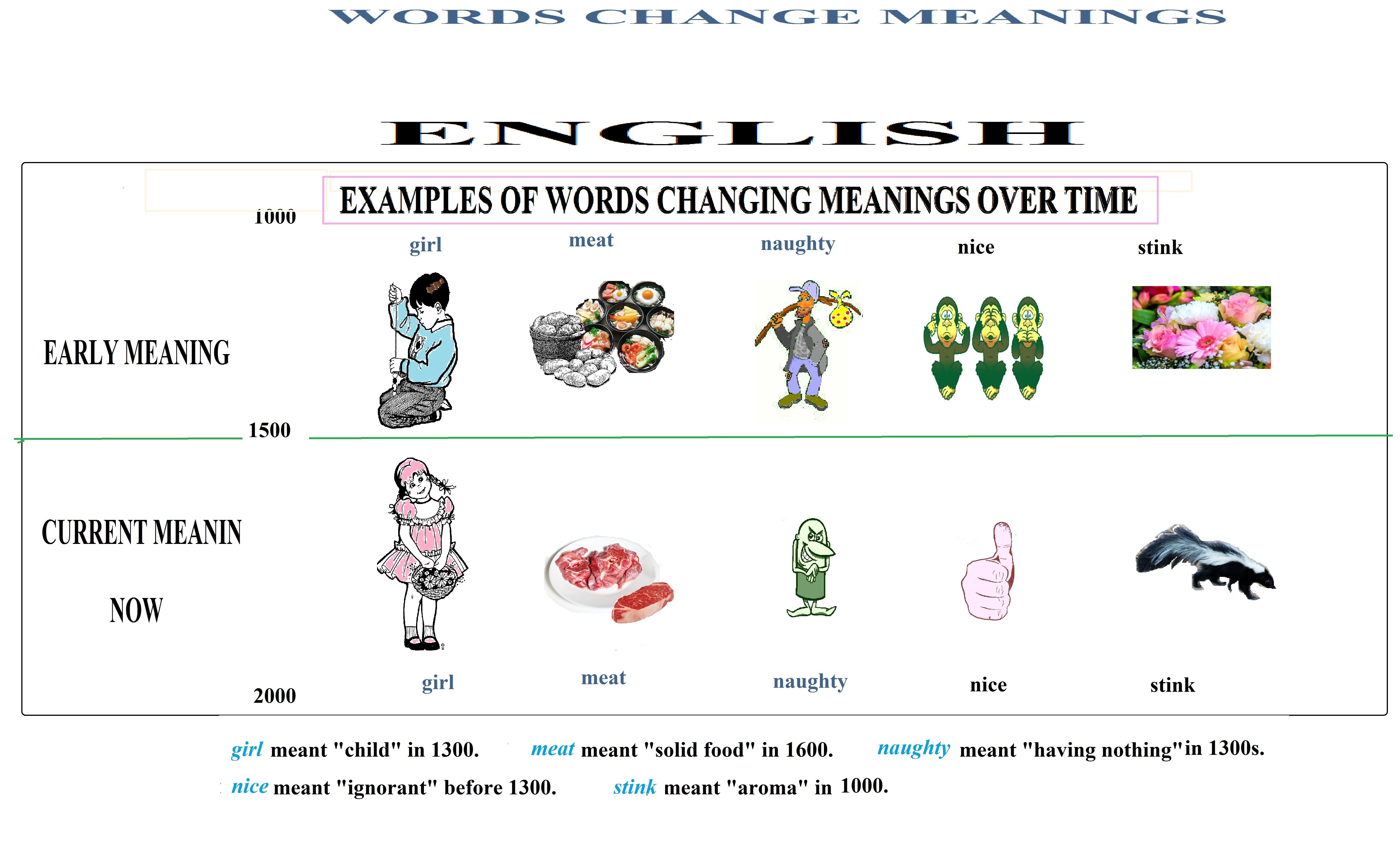

#4: SQUEEZING THE GREEK: PSALLO
Out of the only five references in the KJV that mentions "sing", the Greek word psallo is the chief one.i

Recently, a preacher wrote an article quoting lexicon information on the etymology of psallo to prove that in the New Testament it meant just "sing." Someone criticized the preacher for "squeezing the Greek word psallo." And I thought to myself that perhaps that's what all language interpreters and translators do for us who are ignorant of a particular language. They are squeezing the unknown language of its various nuances and meanings to help us to understand the message. I taught English Second Language (ESL) to adult students whose parent languages were different; e.g., French, Haitian, Spanish, Mandarin, etc., and they were visibly hungering for the squeezed juice of English so that they could speak to and understand Americans successfully. Surely, serious students of the Bible ought to also be desirous of the meanings of the Holy Spirit's Scriptures (2 Timothy 2:15).
WHY GREEK IS THE LANGUAGE OF THE BIBLE. Why are we interested in Greek for understanding the Bible? Wasn't the OT written in Hebrew? The answer to the last question is "yes" and "no." "Yes", it was originally written in Hebrew but we don't have any original Hebrew copies. What we do have now is an ancient Greek translation (LXX).
Following the conquests of Alexander the Great (336-323 BC), Greek became the shared language and diplomatic communications in and even beyond the borders of the empire.ii It is called KOINE (common) Greek. The Greek Septuagint is an "authorized" translation of the OT by 72 Jewish scholars about three centuries before Christ. It made the Hebrew Scriptures available both to the world's Jews who no longer spoke their ancestral language and to the entire Greek-speaking world. Consequently, it was the Bible of the Greek-speaking early Church, and it is frequently quoted in the New Testament. The Septuagint was eventually abandoned by the unbelieving Jews because of its reception by the Gentile Christians. They preferred their newly compiled Jewish Masorah version.iii
ATTEMPT BY INSTRUMENTALISTS. Whether or not to add musical instruments in church worship has been a controversy for only over the last thousand years. The main reason I suppose that we are now "squeezing" the Greek psallo is because of those learned souls that have appealed to their idea that in the NT psallo is embedded the authority for using instruments in worship. But by "squeezing" the Greek psallo we must conclude that musical instruments in church worship cannot be so defended. An appeal to earlier meanings prior to the KOINE era reverts to a form of Greek which scholars unanimously affirm is not the Greek of the New Testament, and it interprets Greek words in ways which scriptural context and historic interpetation will not support. One can say with confidence that the term psallo makes no suggestion of instrumental accompaniment in worship services authorized by the New Testament.
SINGING AND PSALLO. A casual look at most Greek lexicons (vocabulary dictionaries) will reveal that the word psallo did not always have to do with music. Neither did it just hatch overnight into the expression "to sing."iv It was a gradual metamorphosis beginning back in 1500 BC when the culture of the Mycenaean Greeks replaced the earlier Minoan inhabitants in this northeastern Mediterranean area. This word originally was used to refer to "plucking hairs" or "the act of twitching a carpenter's red line." It referred also to the "twanging the arrow's bow string".v The scholar Kittel points out that it meant "to pluck the string, to cause it to spring, of the string of a bow."vi At this early phase of use, the word had no known association with music nor musical instruments.vii
During the Ancient Period of Homer's Greeceviii, the word "psallo" came to mean the striking of the strings or chords of a music instrument.ix E. W. Bullingerx tells us that the word came to mean "to touch the lyre or harp."
Then we come to the Classical Period of Athens, around the sixth century BC that lasted only about 300 years. The word "psallo" progressed from play(ing) a stringed instrument (only) (to) then finally both sing and play.
Finally, by the first century AD during the KOINE period, it meant only to "sing."xi Vincent's Word Studies says, "A psalm was originally a song accompanied by a stringed instrument... The idea of accompaniment passed away in usage." Ephesians 5:19 and 1 Corinthians 14:26 refer to psalms appropriate to the gospel (the context of the second reference is speaking of original inspired led psalms).

LEXICOGRAPHERS.
Thayer
and Robertson
agree
that psallo
does not suggest musical accompaniment in the Koine of the New
Testament. In
1985, Bromiley,
of the Theological
Dictionary of the NewTestament (p.
1226),
expressed it this way: “[psallo]
does
not now denote literally playing on a stringed instrument." In
the
Exegetical
Dictionary of the New Testament,
Balz and Schneider wrote: “In the NT psallo
always refers to a song of praise to God” (p. 495). Vinexii
says
it "denotes, in the N.T., to sing a hymn, sing praise."
J.H.
Moulton
and Milliganxiii
define it with, "in the N.T., as in James 5:13, sing a hymn."
Abbott-Smithxiv
say of it, "in the N.T., to sing a hymn, sing praises."
These are just a short list of sources on the word psallo.xv
VERSIONS. It is not surprising then that no standard (committee) translation of the English language (e.g., KJV, ASV, RSV, NEB, NIV, NASB, NKJV, ESV) provides a hint of instrumental music in any of the five texts where the verb is found in the New Testament.
ENGLISH WORDS CHANGE ALSO. An example of how words change their meanings: a sweetheart lady of the thirteenth century AD English would exclaim with delight to her beau when receiving a bouquet of flowers from him, "Oh, how it stinks!" Today, that would be an insult. Languages change over a period of time.
Finally, for this lesson, I compared the KJV's OT text (which is translated from the modern Masoretic Jewish Bible) with the ancient Greek Septuagint's use of psallo. Remember that the LXX was translated while Classical Greek was gradually revolving into Koine. The Greek psallo corresponded to the Masoretic zamarH2167 in the OT Psalms (KJV generally translates this word as "sing praises"). David's playingxvi the lyre for King Saul (1 Sam. 16:16) is psallo but there it translates another Masoretic Hebrew word naganH5059 and not zamar. NaganH5059 is there accompanied by the hands (compare certain psalms; e.g., Psalm 27:6; 98:5). The KJV's Isaiah 23:16 translates nagan as "make (sweet) melody."
E. A. Sophocles's Greek Lexicon of the Roman and Byzantine Periods provides an extensive study of the Koine period of Greek from 146 BC to 1100 AD (a couple hundred years after the LXX was translated) and he concluded that the word psallo during the entire time span meant exclusively "to sing."xvii
The New Testament requires each Christian to psallo ("sing"). If Koine meant inherently to "sing and play a musical instrument" (the lexicons say otherwise) then the NT would require each of us (1) to play a musical instrument in our hearts to the Lord (which is ludicrous) plus (2) each one to sing and each one must play an instrument individually to the rest of the assembly (Ephesians 5:19; Colossians 3:16; 1 Corinthians 14:15).
- Gaylon West
Throw Out the Lifeline
MENU
i Romans 15:9; 1 Corinthians 14:15; James 5:13. "Make melody" in Ephesians 5:19 is also from psallo.
ii https://en.wikipedia.org/wiki/Languages_of_the_Roman_Empire
iii The Masoretic Text (MT) is the "authoritative" Hebrew and Aramaic text for Rabbinic Judaism. It is not the original text (Urtext) of the Hebrew. It is the basis for most of the Bible versions; the Septuagint is used generally to "confirm" the text as being genuine. https://en.wikipedia.org/wiki/Masoretic_Text
iv ψαλω τω πνευματι ψαλω δε και τω νοϊ ::: (I will) psallo with the pneumati (spirit) and psallo with the noi (mind) also. KJV, 1 Corinthians 14:15b, "I will sing with the spirit, and I will sing with the understanding also."
v Liddell & Scott. Classical Greek Lexicon, p. 2018. Abbott-Smith, p. 487. Thayer, p. 675.
vi Theological Dictionary of NT, Complete (Big Kittel)
vii http://www.pb.org/PBDocs/Psallo.html
viii "It is generally accepted that the [Homeric] poems were composed at some point around the late eighth or early seventh century BC." https://en.wikipedia.org/wiki/Homer
ix Analytical Greek Lexicon, p. 441.
x A Critical Lexicon and Concordance to the English and Greek New Testament , by E. W. Bullinger, p. 493.
xi Word Meanings in the New Testament, Ralph Earle Finally it was used in the sense ‘to sing’” (p. 333).
xii Vine's Expository Dictionary of the New Testament, Under "melody."
xiii Vocabulary of the Greek Testament
xiv Abbott-Smith's Manual Greek Lexicon of the New Testament.
xv David Pyles. "Implications of the Greek Term Psallo for Church Music (primitive Baptist)." http://www.pb.org/PBDocs/Psallo.html
xvi 1 Samuel 16:23, etc.
xvii I checked the LXX's psallo with the Mesoretic Hebrew's zamar H2167 and naganH5059 . NaganH5059 meant to play an instrument such as David did for Saul during his mental illness. ZamarH2167 meant to sing. Since this is true, the classical meaning of psallo was obviously still in use when the LXX's scholars were translating.

|